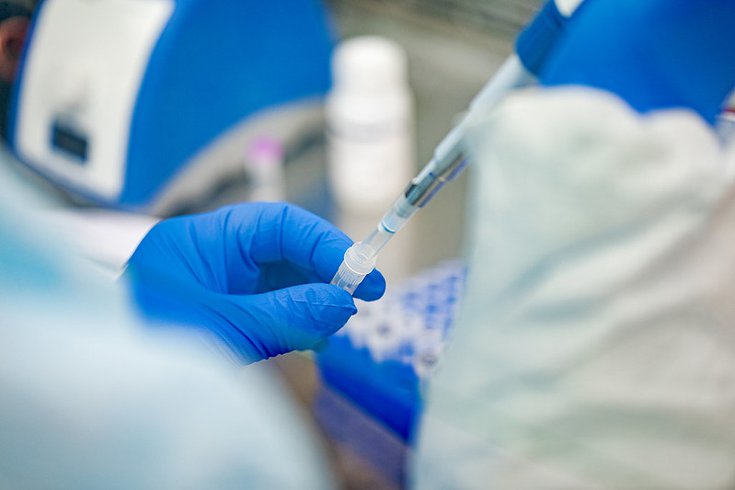
April 16, 2020
 Courtesy/PA Department of Health
Courtesy/PA Department of Health
Philadelphia is receiving inconsistent batches of COVID-19 test results from labs, making it difficult for the city to measure its day-to-day progress reducing coronavirus infections. Above, microbiologist Kerry Pollard performs a manual extraction of the coronavirus inside a lab at the Pennsylvania Department of Health Bureau of Laboratories.
Lab delays in reporting of COVID-19 test results have made it difficult for Philadelphia officials to gauge the city's progress in slowing the coronavirus infection rate during a time that is thought to be a possible peak.
Over the past several days, Health Commissioner Dr. Thomas Farley has noted that the number of daily new infections appears skewed by uneven lab reports on test results. That statistic is among the most important indicators of where the city stands because it reflects whether the rate of infection is slowing down.
"Today, we received twice as many laboratory reports as we did yesterday," Farley said. "Unfortunately, our laboratory data is coming in batches, which makes it hard for us to really follow the trends."
During the first three days of the week, Philadelphia reported between 300-350 new cases per day, a significant drop from the 500-550 range seen last week. On Thursday, the city reported 604 new cases, bringing Philadelphia's total to 8,045.
"I wish I understood how this works, because I've asked in the past couple of days and our staff spoke to the laboratories themselves," Farley said. "The laboratories said, 'Oh no, you're getting your results every day, no problem.' Nonetheless, we got about 800 results yesterday and close to 1,500 results today."
Those lab delays also factored into the city's reporting of 42 new deaths on Thursday, the highest single-day figure since the start of the epidemic. The city has 264 fatalities in total. Because test results are required to confirm whether a death was caused by COVID-19, Thursday's higher number reflects delayed testing data.
Many of the results that came in Thursday were for people who were tested as many as six days ago, Farley said.
Private U.S. labs account for about 85% of the nation's COVID-19 test processing. After seeing unprecedented demand and supply shortages, industry leaders said this week that coronavirus testing is down considerably. The labs have unused capacity that should be dedicated to screening lower-priority patients who have generally struggled to get tested over the last month.
Even with testing down 30% nationwide in the last week, the stringent criteria to receive a test may be falsely masking the demand for them.
The timing makes Philadelphia's apparent lags difficult to explain.
"I don't fully understand why we're getting the data in batches, but I wish I did understand that," Farley said. "If we can, we'll try to fix it and then we would smooth out our data."
A graph on the health department's website suggests new infections are slowing, despite the inconsistent data. But lab delays are just one of several lags built into the epidemic. It takes time for residents to become sick, schedule tests, wait for available slots and then wait for the results, by which time they may already be critically ill.
"It looks like we've hit a plateau, where we've been pretty level over about a week in the number of new cases per day," Farley said. "If you ignore the data for the past few days, where we think it's incomplete, we may have hit a plateau. I can't say that we're seeing decreases yet."